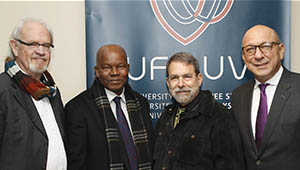Latest News Archive
Please select Category, Year, and then Month to display items
02 January 2025
|
Story Gerda-Marie van Rooyen
|
Photo Supplied
 Leading the research in South Africa is Prof Linus Franke from the Department of Soil, Crop and Climate Sciences.
Leading the research in South Africa is Prof Linus Franke from the Department of Soil, Crop and Climate Sciences.
Scientists are actively pursuing the successful breeding of diploid hybrid potatoes from inbred lines. This is expected to revolutionise potato breeding as it holds the key to rapid genetic progress. It will introduce new varieties for commercialisation through seed. Currently, existing potato variants have a gene that renders self-pollinated seeds infertile.
Prof Linus Franke, an academic in the Department of Soil, Crop and Climate Sciences at the UFS, is leading the research in South Africa. “This technology allows the production of genetically uniform potato seed that is easy to transport and largely disease-free.” He says this differs from conventional breeding whereby only vegetative propagation is possible due to tetraploid varieties in potatoes. It also risks carrying pests and diseases from one generation to the next – leading to the accumulation of pests and diseases with each round of multiplication.
Seed innovation
Prof Franke explains that Solynta BV, a seed company based in the Netherlands that produces potato varieties that can be grown from seed, has included South Africa in their research efforts because it is one of Africa’s largest producers and exporters. Through his academic relationship with Wageningen University and Research, a Dutch institution renowned for its agricultural endeavours and food production, the UFS became involved in researching hybrid potatoes grown from seed.
Diploid seeds containing two sets of chromosomes allow easier gene manipulation to increase predictability and speedier genetic progress. The breeding approach enables the incorporation of tolerance to pests, diseases, abiotic stresses (cold, heat, drought) and other desired genetic traits.
Although Prof Franke is optimistic about this research, he is not blind to disadvantages. “Potato seeds are tiny and have little energy reserves, making it harder to grow potatoes from seed than from tubers.” He says potatoes from seed will take longer to cultivate than tubers, as farmers need to grow plantlets from seeds first, adding six weeks to the growing period. “It is possible that commercial farmers can grow potatoes directly from seed. Alternatively, perhaps more likely, specialised growers will produce tubers of potatoes from seed; these tubers are then sold as seed tubers to other potato farmers, who then continue their normal practices of producing potatoes for the market from tubers.”
Financial benefits
Prof Franke says farmers have reason to get excited. “Seed potatoes will reduce input costs, as varieties with enhanced tolerance to pests and diseases require less pesticides. Planting one hectare of potatoes requires three to four tonnes of potato tubers, but only one 25 g packet of potato seeds.” Since potatoes are a more valuable commodity than maize, this technology might also increase farmers’ income potential.
Trevor Manuel and Max du Preez among the recipients of honorary doctorates at UFS graduation
2016-07-02
 The UFS awarded four honorary doctorates
The UFS awarded four honorary doctorates
at its Winter Graduation ceremonies.
The recipients are from left Max du Preez,
Dr Reuel Jethro Khoza, Prof Joel Samoff
and Trevor Manuel at the UFS Chancellor’s
Dinner on 30 June 2016. Photo: Johan Roux
He is excited about the young minds he saw and interacted with at the graduation ceremony of the University of the Free State (UFS). This is what Max du Preez, one of South Africa’s leading journalists and political analysts, said after receiving an honorary doctorate.
According to Du Preez (Humanities), he was inspired by the Winter Graduation ceremony on 30 June 2016 in the Callie Human Centre on the Bloemfontein Campus. He is happy to finally also call the UFS his alma mater. He grew up in Kroonstad and is a true Free Stater, but previously graduated at the Stellenbosch University.
The UFS awarded four honorary doctorates – the others to Prof Joel Samoff (Humanities), Trevor Manuel and Dr Reuel Jethro Khoza (both Economic and Management Sciences) – and two Chancellor’s medals at the morning ceremony on 30 June 2016. Chancellor’s medals were awarded to Antony Osler and Marguerite van der Merwe (née Osler).
Manuel impressed by amount of soul
At the Chancellor’s Dinner, which was held in the Centenary Complex on the Bloemfontein Campus on 30 June 2016, Du Preez said he feels honoured. He said South Africans must embrace the diversity of the country, and the UFS is a good example. “If the University of the Free State can make it, South Africa can make it.”
Manuel, a former South African Finance Minister, said he is honoured by the amount of soul he experienced from Dr Khotso Mokhele, UFS Chancellor, and Prof Jonathan Jansen, Vice-Chancellor and Rector of the UFS. “We cannot tolerate what is wrong (in the country) and need to push the boundaries of what is right,” he said.
UFS stands out regarding understanding
Dr Khoza, a distinguished thinker and businessman, also thanked the UFS at the Chancellor’s Dinner. “We shall strive to be known less for what we say, but rather more for what we do,” he said about the country.
According to Prof Samoff, Professor in Africa Studies at Stanford University (USA), “South Africa has committed itself to building a democratic, non-racist, and non-sexist society”. “Where the University of the Free State stands out, is in its understanding that societal change – ‘transformation’, to use the current terminology – is not an outcome, but a process. A difficult process.”
Media Enquiries
Contact person: Lacea Loader (Director: Communication and Brand Management)
Tel: +27(0)51 401 3422/2707 or +27(0)83 645 2454
Email: news@ufs.ac.za | loaderl@ufs.ac.za
Fax: +27(0)51 444 6393